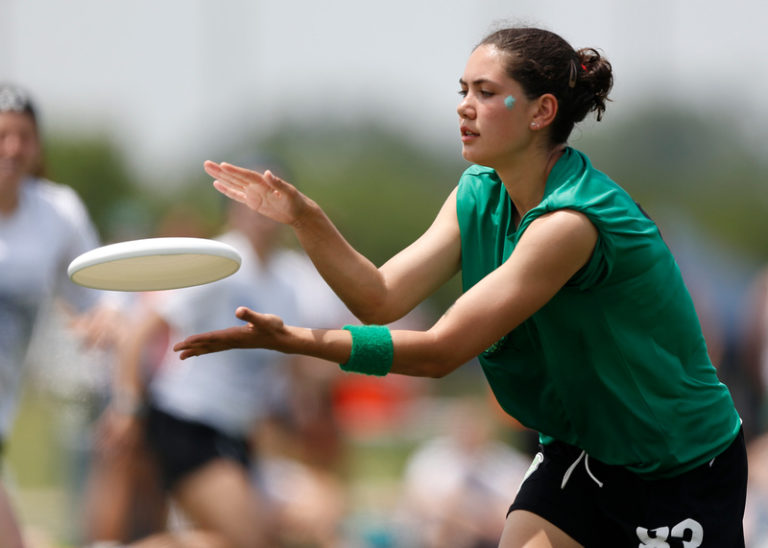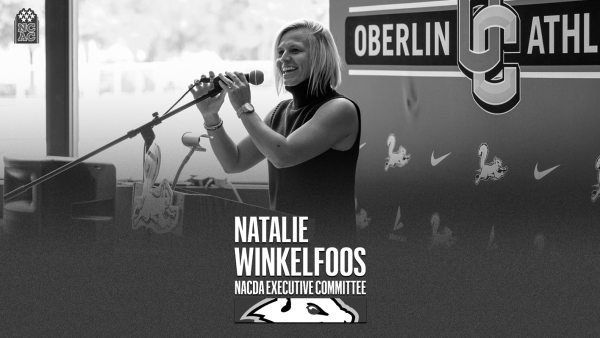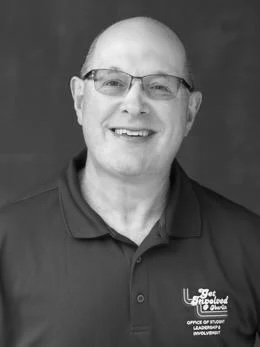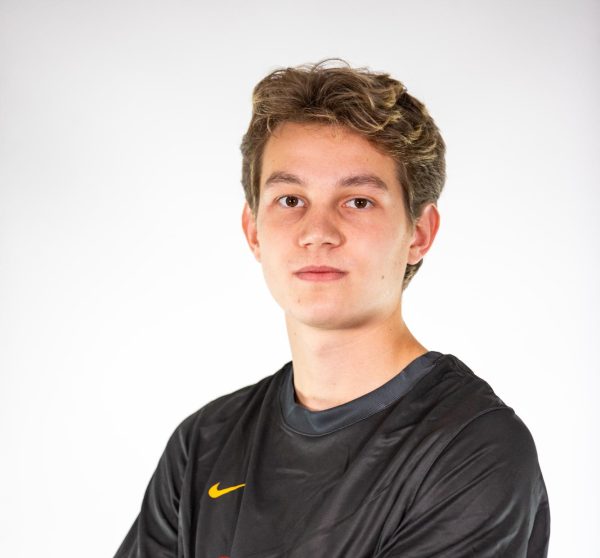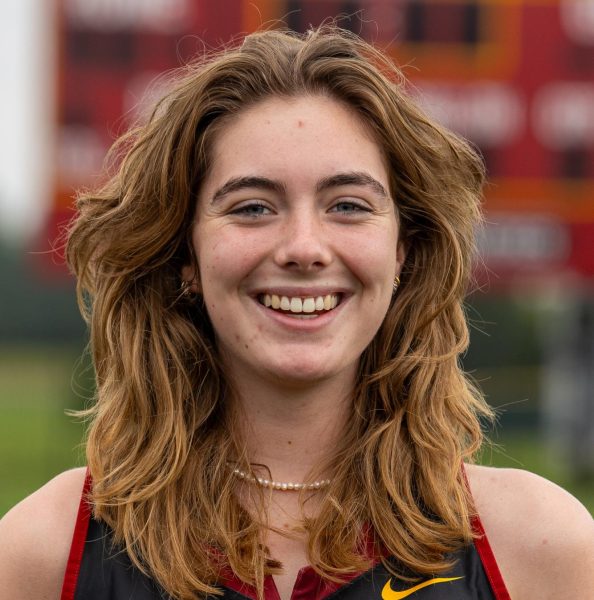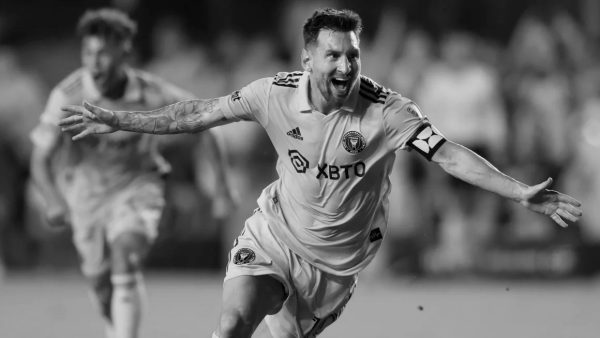In The Locker Room with Zoe Hecht, Ultimate Frisbee Championship Player
College junior Zoe Hecht
Massachusetts native Zoe Hecht is a College junior, Geology major, and captain of the Division III National Championship-winning ultimate Frisbee team, the Preying Manti. When she is not leading the team to victory, she is working in a geology lab and playing ultimate Frisbee for club and professional teams, traveling on the weekends around Ohio and Michigan for games. This past summer, Hecht traveled to Germany to play for the U.S. U-24 Mixed National Team, and won the World Championships. She began her ultimate career on her high school’s ultimate Frisbee team, and has since proven to be a force to be reckoned with both on and off the field.
This interview has been edited for length and clarity.
What was it like going from playing ultimate Frisbee on campus to traveling to Germany to play on the U.S. U-24 Mixed National Team against people from different colleges from all around the world?
It was really wild. I have played for a couple of club teams over the summer, so the College team isn’t the only experience that I’ve had playing. I’ve played with people from around the country before, but never anything like this — I mean, it’s just a combination of basically all of the best players my age coming together and doing something that we all care a lot about and have put a lot of time into. And it was one of the most special things that I can imagine. Just having all those people in the same place, with the same goals. And for the two and a half weeks — or however long — we were in Germany, the only thing that mattered was that team. That goal of winning a gold medal is such an incredible privilege to have [to] focus on, and to not have to think about anything else for that amount of time. It was amazing.
Was the team just in Germany the entire time or were you doing trainings throughout the summer leading up to going to the competition?
We had one training camp in Colorado for a weekend in June, and then we had a week-long training camp in Germany, and then the tournament was a week long. That was the whole thing; it was a total whirlwind.
How is it balancing classes and this additional commitment?
It’s hard. I didn’t have any free weekends after April of last year. I was gone every weekend and it just means that my emotional, social, and physical energy is lower at school than it would be ideally. But in a different way, it keeps me alive and keeps me going. And it’s really good for me to have something outside of school that I love doing and can do when I want to. So it’s a tricky balance. But I’m definitely glad that I’m doing it.
Your brother plays Frisbee too?
My brother plays and my sister plays and both of my parents played. My brother was on the men’s [U-24] National Team, and it was incredible getting to be there with him. That was beyond my wildest dreams. He was playing as well on the [National] Team.
You were both on the team, did your parents also go to Germany?
My parents were there, my whole family came. We were on different teams — we didn’t play together because there were three teams from the U.S. — but we were all part of the same delegation. It was amazing.
How old were you when you started playing ultimate Frisbee?
I started playing the fall of my sophomore year of high school. I don’t know how old that makes me. I think 16. It’s been a few years.
What led you to ultimate Frisbee?
It was mostly my brother; my parents didn’t push it on us. My earliest memories are of being at Club Nationals. I’m not sure exactly what training it was, but some training with them, and my parents were playing in it in Florida in 2002. So it definitely has been a part of my life and something that I’ve known has existed for a long time, but it wasn’t something I ever thought about until one of my cousins actually played in high school. And then my brother took after my cousin, and then I was pressured into it, basically, and eventually I gave in.
Last season the Preying Manti won the DIII National Championship. What was that moment like?
That was an indescribable moment. I can’t decide yet whether I didn’t think we were going to win or that I knew all along that that was something we were going to do. I’m not sure that makes sense, but I’m super wary of being overconfident and a very superstitious person. And so if people would ask if the team was that good and if we were gonna make it to nationals and if we would play well at regionals and things like that, I always had to go into it doubting myself and doubting the teams so I wouldn’t jinx it by being overconfident.
But at some point after we won regionals, one of my really close friends looked at me and said that we should “just go win nationals. That’s something you all can do and there’s no reason why you shouldn’t.” I think that flipped the switch in my mind that was like, “Yeah, that’s the only thing that makes sense anymore.” Our team is the best team in the country and we have to do this thing so that everyone else knows it. The final game was against Bates [College], which was a team that was supposed to be the best team in DIII college ultimate by a lot. And no one had ever come close to beating them all of last season. Even during the whole final game, the commentators were talking about how shocking it was that Bates [College] was falling.
But in the end, the last score wasn’t that surprising because we were winning by seven points or something ridiculous like that. There was a point in the game where I realized that there was almost nothing that we could do to lose at that point. Everybody on our team was playing the best ultimate that they had ever played and everyone was peaking all at once. And we had won.
How do you guys bring together this national championship winning team?
It’s hard. There are a lot of things that we have to balance. But a lot of it is just about trust and encouragement and figuring out how to give figures from the captain’s perspective. Figuring out how to unlock each player on the team so that they can not only reach their full potential as a player, but also so that they truly understand how best to give themselves to the team. The leadership in general can only do so much, and a ton of what goes into winning has to come from every single person. We did team workouts, we did some contact improv as a team.We had a bunch of lowkey social events, like a friendship bracelet, puzzles and things like that. Just trying to get people as comfortable with each other and with their own bodies and with their own emotions and everyone else’s emotions, so that we could blend at the right moments and everyone knew what was going to happen next for each person when playing.
How does it feel to be back?
It feels really surreal. I am not grounded in my schoolwork or this place or anything yet and I’m trying to figure out how I can become that way. The transition back after being in Germany was really, really hard for me. It’s still something I’m trying to figure out. Just because of that almost dream-like state that I mentioned earlier. My job was to play ultimate with incredible people who I didn’t get enough time with, who I am still thinking about and missing. To be back doing anything else feels wrong and cruel. But I know that it’s not true. I am really excited to be back and I love school. I’m excited for the classes I’m going to take this semester. And then overwhelmingly excited for the new year with the Manti. But at the same time, I don’t know where I am or why I’m here because to some extent it feels like I should still be there doing that. So that’s something I’m trying to figure out.
Outside of ultimate Frisbee and geology research, what are your other interests?
I don’t have that much time for other interests. I’m part of a co-op; I eat in Harkness [House]. I lived in Keep [Cottage] spring semester last year. I’m working in the Quantitative Skills Center this semester as a geology tutor. I’m really charged with my free time and try to spend it doing as little as possible with people that I love.
What are your plans for next summer?
Definitely I’ll be playing club [ultimate Frisbee]. I might play professionally again. The under-20 World Championships are only held every other year, so I’m going to be able to do that again next year, but the year after — unless something terrible happens and I am injured or otherwise unable to play — I should be back on that team.
What’s the difference between club and professional ultimate?
Club ultimate right now I think is the most watched and most followed division. And those are regionally-based teams. They set up in certain cities wherever people want to start club teams, and you can have club teams at every level. I’ve been playing elite club, and Club Championships are held every year, which is one of the most prestigious tournaments in the country. The professional scene is just getting off the ground because it’s such a small sport. So this spring was the first ever women’s and trans inclusive professional league, which I was a part of, and we got paid $20 a game. We’re trying to gain legitimacy and trying to figure out how, as a sport, we can push to be seen more. It feels to a lot of people like professional ultimate is the next step towards that. I don’t know anything about the men’s professional scene as far as the women and trans side of things goes.
Are all the teams trans-inclusive?
Not exclusively but many are. I used that language when talking about the professional league because part of their mission is to be inclusive of non-binary players and of trans players as well as women. And so it’s women’s with an X. There are several trans and non binary players at all levels of ultimate. So the ultimate community is trying to find the right language to show that we can be inclusive. It’s actually been hard to try to continue using that language as we try to legitimize the sport. As we’ve started to be broadcasted by ESPN, they force the men’s division to be called the men’s division instead of the open division, which it has been traditionally called, which changes it from being an open space that anyone can play [in] into the men’s space, which is an interesting shift. So we’ll see how that goes as we try to legitimize and also stay inclusive.
Do you think ultimate Frisbee is one of those sports at the forefront of bringing in this idea about gender being non binary in sports?
I think. I don’t know very much about other sports and where they stand on all of that. But there’s definitely a lot of conversations happening in ultimate all the time about gender equity [and] racial and class equities. One of the biggest perceptions of ultimate, which is pretty accurate, is that a lot of the people who play ultimate are cis, white, upper-class people who have the time and resources to devote towards this semi-legitimate activity. But there’s a lot of effort and resources being put towards inclusivity at all levels. It’s far from perfect, but I think that I would be surprised if I saw such conscious efforts and activities going on at the highest levels of more established sports. People have recognized our potential as the younger sport to become more inclusive earlier on and be intentional about the ways that we grow our sport.


